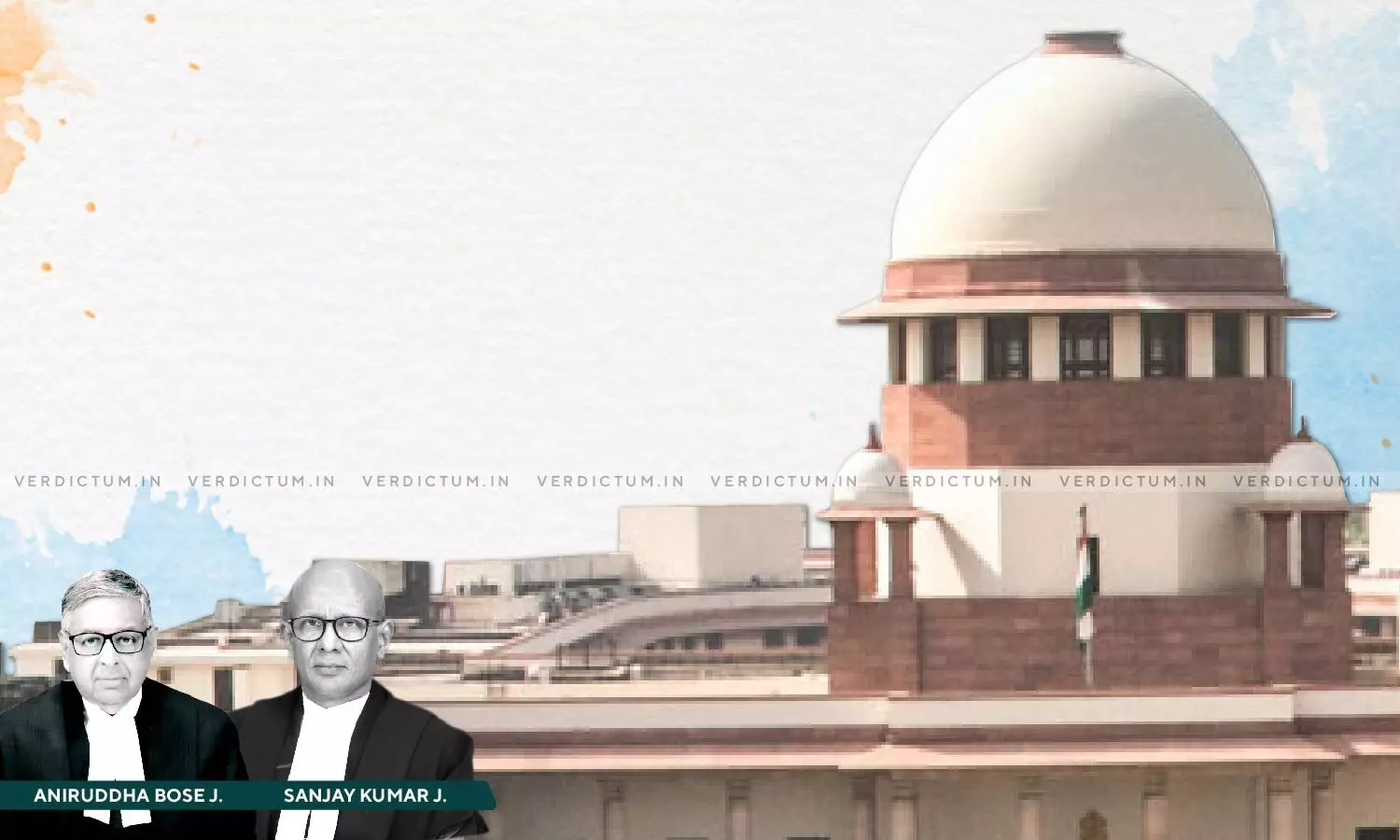
NCDRC Cannot Rewrite Terms Of Agreement: SC Directs Builder To Refund Buyers For Not Delivering Possession Of Apartments Before Agreed Date
 |
|The Supreme Court, while directing a builder to refund buyers for not delivering possession of apartments before agreed date, observed that NCDRC cannot rewrite terms and conditions of an agreement.
The Court observed thus in an appeal filed by two buyers who were aggrieved by the order of the National Consumer Disputes Redressal Commission (NCDRC).
The two-Judge Bench comprising Justice Aniruddha Bose and Justice Sanjay Kumar held, “it was not open to the NCDRC to apply its own standards and conclude that, though there was delay in handing over possession of the apartment, such delay was not unreasonable enough to warrant cancellation of the Agreement. It was not for the NCDRC to rewrite the terms and conditions of the contract between the parties and apply its own subjective criteria to determine the course of action to be adopted by either of them."
The Bench said that once the parties committed themselves to a written contract, whereby they reduced the terms and conditions agreed upon by them to writing, the same would be binding upon them and in the event such a written contract provided for the consequences that are to follow in the event of breach of the conditions by one or the other of the parties thereto, such consequences must necessarily follow and if resisted, they would be legally enforceable.
Senior Advocate Vivek Chib represented the appellants while Advocate Rahul Kripalani represented the respondent.
Factual Background -
The appellants were the complainants who intended to purchase an apartment in a building to be constructed by the respondent company in Mumbai. The parties executed an Agreement to Sell by which an apartment was allotted to the complainants. As per the payment schedule, the sale consideration was to be paid in four sets of ‘application money’ and the balance amount to be paid on initiation of fit outs. As per the agreement, possession of the apartment was to be delivered to the complainants for fit outs by June 30, 2016, or with a grace period of one year.
Alleging that the company did not deliver the possession of the apartment for fit outs by the aforesaid date and that they terminated the agreement, the complainants approached the NCDRC. Their prayer was for refund of the amount paid by them with a compound interest along with compensation for the harassment, mental agony, and torture suffered by them apart from litigation costs. Being aggrieved by the disposal of their case by the NCDRC, the complainants were before the Apex Court.
The Supreme Court in view of the above facts noted, “Significantly, the ‘Part Occupancy Certificate’ obtained by the respondent-company is not in the aforestated format and states to the effect that a ‘Full Occupation Certificate’ may still have to be obtained thereafter. The said certificate cannot, therefore, be equated to the ‘Occupancy Certificate’ issued under Regulation 6(7) of the Development Control Regulations, 1991.”
The Court added that the fact that the appellants were anxious to avoid the additional tax liability, owing to the introduction of the Goods and Service Tax regime, the same cannot be held against them or be imputed to them as an underhand motive for backing out of the Agreement.
“Avoidance of tax is neither illegal nor equivalent to tax evasion and, therefore, the urgency shown by the appellants in trying to complete the process quickly so as to avoid an additional tax burden was natural. Further, it cannot be presumed that the appellants, who were willing to spend over 7.5 Crore for the apartment, ₹ would back out at the eleventh hour only because the tax component was increasing by 40 lakh or so”, it said.
The Court further observed that the NCDRC overstepped its power and jurisdiction in ignoring the binding covenants in the agreement and in introducing its own logic and rationale to decide as to what the future course of action of the parties and more particularly, the appellants, should be.
“As we are informed that the appellants did not choose to act upon the belated offer of the respondent-company, in its letter dated 29.11.2017, and are still intent on terminating the Agreement as per Clause 11.3 of the Agreement, we set aside the order dated 09.11.2022 passed by the NCDRC and allow Consumer Complaint No. 35 of 2018, directing the respondent-company to refund the deposited amount of 2,25,31,148 ₹ /- in twelve equal monthly installments, through post-dated cheques, with simple interest thereon @ 12% p.a., from the date of receipt of the said amount or parts thereof till actual repayment. The first such installment shall be payable on the 5th of April, 2024, and the succeeding installments shall be payable on the fifth of each calendar month thereafter, till fully paid”, it directed.
Accordingly, the Apex Court allowed the appeal to the above extent.
Cause Title- Venkataraman Krishnamurthy and another v. Lodha Crown Buildmart Pvt. Ltd. (Neutral Citation: 2024 INSC 132)
Appearance:
Appellants: Senior Advocate Vivek Chib, Advocates Anandana H. Wadhwa, Anirudh Wadhwa, AOR Vipul Kumar, Advocates Shashwat Awasthi, Mansi Gupta, Unnati Jhunjhunwala, Bina Harini G, and Rithvik Mathur.
Respondent: Advocates Rahul Kripalani, Suhasini Sen, AOR Ankit Yadav, Advocates Supraja V., Prakriti Rastogi, Aditya Pratap Singh Chauhan, Surbhi Singh, Pracheta Kar, Aditya Sidhra, and Nadeem Afroz.